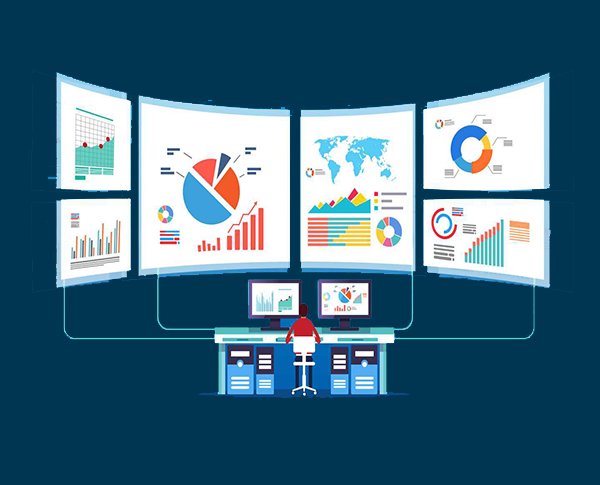Introduction
In today’s data-driven world, the ability to extract insights from information is a powerful asset. Data analytics professionals bridge the gap between raw data and actionable knowledge, transforming numbers into strategies that drive business success. If you’re intrigued by the potential of data and yearn to unlock its secrets, a data analytics course might be the perfect first step. This guide delves into the world of data analytics courses, exploring the diverse options available, the benefits of enrolling, and equipping you with the knowledge to choose the right program to launch your data analytics journey.
Unveiling the Power of Data: Why Invest in a Data Analyst Course?
Data surrounds us. From online purchases to social media interactions, our daily activities generate a constant stream of information. Data analytics professionals act as translators, transforming this raw data into actionable insights that businesses can leverage to make informed decisions. A data analytics course equips you with the foundational knowledge and practical skills to navigate the exciting world of data.
Unlocking the Advantages of Data Analytics Training
Investing in a data analytics course unlocks a multitude of benefits:
- Master the Fundamentals of Data Collection and Cleaning: The course will delve into the essential steps of data collection, from identifying relevant sources to ensuring data accuracy and completeness. You’ll learn essential data cleaning techniques to prepare raw data for analysis.
- Explore Powerful Data Analysis Tools and Techniques: A well-designed data analytics course will introduce you to various tools like spreadsheets (Excel), statistical analysis software (R or Python), and data visualization tools (Tableau or Power BI). You’ll learn how to leverage these tools to analyze data, identify trends, and generate meaningful insights.
- Develop Problem-Solving and Critical Thinking Skills: Data analysis is more than just crunching numbers. You’ll develop problem-solving and critical thinking skills as you learn to interpret data, identify patterns, and formulate solutions based on your findings.
- Open Doors to Rewarding Career Opportunities: The data analytics field offers diverse career paths. With your newly acquired skills, you can pursue a career as a data analyst, business intelligence specialist, data scientist, or even specialize in areas like marketing analytics or financial analytics.
A Landscape of Data Analytics Courses: Finding Your Perfect Fit
The world of data analytics courses caters to various needs and experience levels. Here’s a breakdown of some popular options:
- Beginner Courses: Building a Strong Foundation: Designed for those with little to no prior experience, these courses provide a solid foundation in data analysis concepts, basic statistics, and data management principles.
- Intermediate Courses: Deepening Your Data Analysis Skills: After mastering the basics, these courses delve deeper into advanced data analysis techniques, like regression analysis, time series analysis, and data mining. You’ll build upon your foundation and refine your skills in data manipulation and visualization.
- Advanced Courses: Mastering Complex Techniques and Tools: Geared towards experienced data analysts, these courses focus on advanced data management techniques, big data analytics tools, and machine learning algorithms. You’ll learn from industry experts and push the boundaries of your data analysis capabilities.
- Specialized Courses: Tailored Learning for Specific Industries: These niche courses focus on applying data analytics principles to specific industries like healthcare, finance, or marketing. You’ll gain specialized knowledge and techniques relevant to your chosen field.
Making the Most of Your Data Analytics Course
To maximize your learning experience:
- Active Participation and Hands-on Learning: Actively participate in class discussions and don’t hesitate to ask questions. Seize the opportunity for hands-on learning exercises and projects, working with real-world datasets to apply learned skills and solidify your understanding.
- Building a Strong Data Analytics Portfolio: Throughout your course, create a portfolio showcasing your data analysis projects. Include examples of data manipulation, visualization techniques, and insights derived from your analyses. This portfolio will be a valuable asset when pursuing job opportunities or showcasing your skills to potential employers.
- Networking with Instructors and Fellow Students: Build relationships with your instructors and fellow students. These connections can offer valuable mentorship, advice, and potential job leads in the future.
Conclusion:
A data analytics course in Chandigarh equips you with the tools and knowledge to translate the language of data into actionable insights. By choosing the right program, actively engaging in your learning, and continuously honing your skills, you pave the way to becoming a sought-after data analyst. So, unlock the power of data, embrace the exciting world of data analytics, and embark on a rewarding career path fueled by insights!
FAQs
- Q: Do I need a strong math background to enroll in a data analytics course?
- A: While a basic understanding of math is beneficial, many beginner courses cater to those with no prior experience. However, some advanced courses may require stronger mathematical foundations.
- Q: How much do data analytics courses cost?
- A: The cost of data analytics courses varies depending on the program duration, location, and institution. Research different options to find a program that aligns with your budget.
- Q: Can I become a data analyst solely through online courses?
- A: While online courses can provide valuable knowledge, most data analyst positions require hands-on experience with data analysis tools and projects. Consider combining online learning with bootcamps or internships for a well-rounded skillset.
- Q: What are the career opportunities for data analysts?
- A: The data analytics field offers diverse career opportunities. You can work in various industries like finance, healthcare, marketing, or even pursue a specialization in areas like data visualization or business intelligence.


